Comsat Angels - Interview with Stephen Fellows
by John Clarkson
published: 12 / 2 / 2006
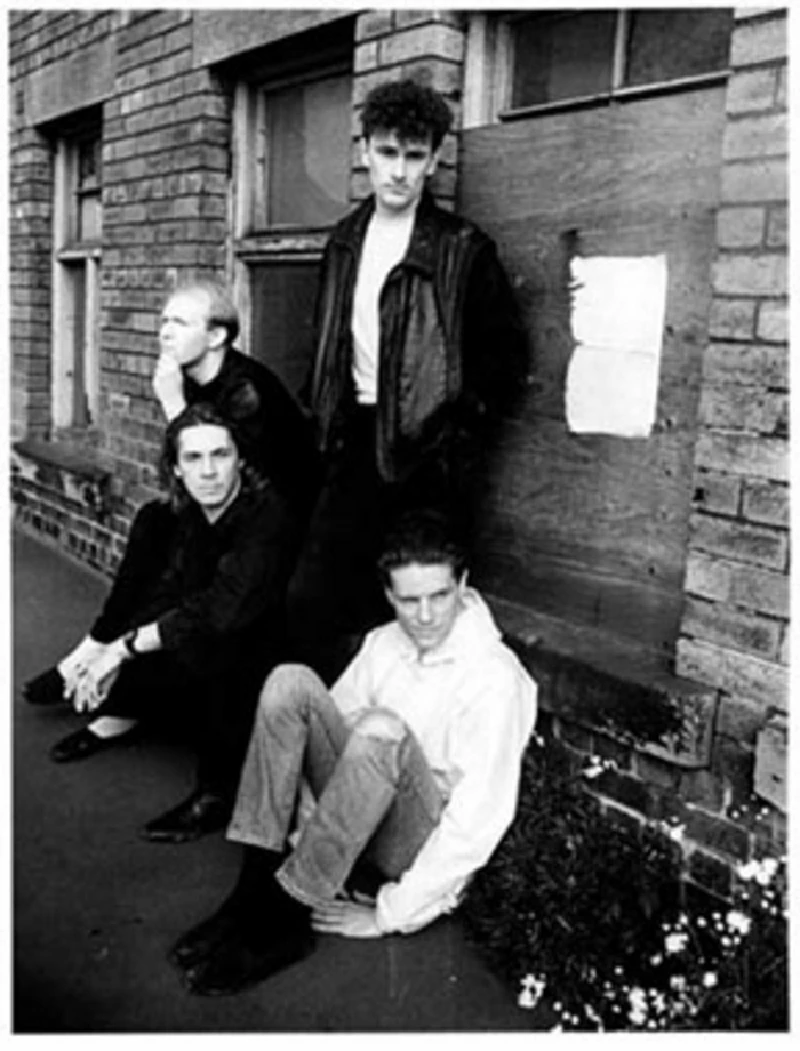
intro
One of the most underrated acts of the early 80's, the Comsat Angels twinned together sparse, economical musicianship and a large sound. While other bands of the era with a big sound such as U2, Simpl
One of the most underrated acts of the early 80's, the Comsat Angels twinned together sparse, economical musicianship and a large sound. While other bands of the era with a big sound such as U2, Simple Minds, Echo and the Bunnymen and the Teardrop Explodes all achieved mainstream success, the Comsat Angels were less lucky and never made the breakthrough into the main arena. Only one single 'Independence Day' touched the nether regions of the charts, scraping its way in a reworked version on its second release in 1984 just into the Top 75 and to No.71. Their second and best known LP, 'Sleep No More', which ran out of copies shortly after it was released, stalled in the albums chart at 51. Although they attracted a loyal and passionate following, they never had a large fan base and, in a musical career that ran over 15 years and across 9 albums, were destined throughout to be a cult act. Perhaps too dark for populist tastes at the time and too fraught with tension musically and in their lyrics, their influence is, however, enormous, the haunting atmospherics and simply played, but expansive nature of their music having a direct effect on both countless Goth groups and bands such as the Chameleons, Interpol and most recently the Editors. The band, which consisted of Stephen Fellows (guitar, vocals); Mik Glaister (drums) ; Kevin Bacon (bass) and Andy Peake (keyboards), first formed in Sheffield in the late 70's and played under various monikers including Radio Earth before settling on the name of the Comsat Angels, taking the new title for their group from a JG Ballard short story. The Comsat Angels released their debut EP 'Red Planet' on their own Junta label in early 1979, paying for it by borrowing money from Mik Glaister's father. After John Peel played it on his late night Radio 1 show and then gave them a Peel Session, they were signed to Polydor, who released their debut album, 'Waiting for a Miracle', the following year. Occasionally tentative, 'Waiting for a Miracle' combined a melodic pop edge with an air of terse menace. There were two singles from it, 'Total War' and the first version of 'Independence Day'. Their second album 'Sleep No More', which came out in 1981, was less poppy, and, more confident-sounding and darker still, is seen by many fans and critics to be the Comsat Angels' masterwork. After a slighter lightly-in-tone third album 'Fiction' (1982) also failed to chart, the group's contract with Polydor ended and they signed to Jive, a subsiduary of CBS. Feeling under increasing pressure to get a hit, they tried to break into the synth pop market that was dominant at the time with their next record, 'Land'(1983). The songs on 'Land' were more upbeat than their previous albums, but, other than spawning the rejigged version of 'Independence Day', it was largely forgettable. Their fifth and final Jive album 'Seven Day Weekend', which was in a similar vein, was equally unsatisfying. For their sixth album 'Chasing Shadows' (1987) the Comsat Angels switched to Island, who signed them on the advice of singer Robert Palmer, who was at that time one of that label's biggest acts. 'Chasing Shadows', upon which Palmer is credited as executive producer, proved to be a partial return to form, maintaining some of the poppiness of the previous two albums on some of its tracks, but also recalling the quality of the first three LPs on others. The group's next album, 'Fire on the Moon', which they released in 1990 under the new moniker of Dream Command, was, however, a more bland affair, suffering both from over production and some weak songs. For their final two albums, 'My Mind's Eye' (1992) and 'The Glamour' (1995) the band, who had reverted to being the Comsat Angels once more, signed to small indie label RPM/Thunderbird. Both albums found them looking them back to their roots. 'My Mind's Eye' threw on more layers of guitar, and combined discordance and melody. Bacon, who was beginning to establish himself as a producer, left shortly after its release, and was replaced on bass by Terry Todd. In an attempt to further build up their sound Simon Anderson was drafted in as a second guitarist. 'The Glamour', by far the band's heaviest record, was a strong post grunge album, but barely sold. When Fellows elected to leave, the rest of the group, after a short spell of playing together with a new singer Peter Hope under the name of Soup, also broke up. Reassessment of the Comsat Angels has been long overdue. Reissue label Renascent, which has already done much to revitalise with their previous releases the careers of other under heard 80's bands the Sound (with whom the Comsat Angels toured in 1980)and the Wild Swans, will re-release in early April the first three Comsat Angels albums and a collection of recordings of their BBC sessions 'Time Considered a Helix of Semi-Precious Stones'. The re-releases, all of which are appearing on CD for the first time, come with extra tracks, extensive sleeve notes and in gatefold sleeving. With another three Comsat Angels albums also due for re-release on Renascent later in the year, Pennyblackmusic, in one of his first interviews to promote the reissues, spoke to Stephen Fellows. PB : The band played under various monikers including Radio Earth before settling on the Comsat Angels. When you were still playing as Radio Earth, you played a gig supporting Pere Ubu in Newcastle. That gig seemed to have a massive effect on the band and its focus and way of doing things. What happened at that gig ? SF : Radio Earth were a young band. We had a manager. We had managed to get some press and had self-released our own single. We were in fact one of the first bands in Sheffield and possibly in Yorkshire to do our own single. We then got offered this show in Newcastle. We had never heard of Pere Ubu, but we were told that they were a very big underground American group. We were confused about what we were doing anyway. We weren’t that serious about it and to see them doing their thing which was very focused made us feel pretty useless. I am sure that an equally valid reaction would have been “They do their thing. We do our thing. We’ll carry on.” But it just suddenly occurred all of us after seeing them that if we put a bit more focus into everything we could be a lot better. PB : What was wrong with what you were doing ? SF : It wasn’t very satisfying to play (Laughs). We were a crap kind of jazz outfit. I guess were trying to ape a lot of the other things that were around at the time as young bands tend to do. PB : Your first EP under the name of the Comsat Angels was ‘Red Planet’. How long after seeing Pere Ubu did you release that record ? SF : The Pere Ubu show was in November ‘78, and that came out four months later in March ‘79. We kept a couple of the old Radio Earth songs, but the others were new. PB : Did you rework the old songs for the EP ? SF : No. It was just we thought “Well, those ones seem to be nearer to where we want to be.” It is very hard to objective about influence, but I don’t think Pere Ubu were a direct musical influence on us, although they are an amazing band and their early records still wear well. It was just kind of how they operated really. It was the way they thought and the way they focused. They were all doing one thing together very co-operatively and were an amazing machine at work. Everyone played their bit to serve a common purpose. We learned a lot from that. We had always had a big sound. We kept that, but at the same time we stripped down our instrumentation. We started playing a lot less, but made it count for a lot more. Hank Marvin from the Shadows was another big influence, especially on my guitar playing. His guitar playing is very minimal. He is a very sophisticated player, but in a very subtle way. He plays very simple lines, but there is a lot of depth to them. I have been listening to the Shadows for years now, and they still sound really fresh. I read with some interest that they were also a big influence on Neil Young in his biography, ‘Shakey.’ PB : ‘Waiting for a Miracle’ has a real sense of edginess and paranoia to it. That album came out in 1981. It was a pretty turbulent time in a lot of ways. Margaret Thatcher and Ronald Reagan had both recently got into power. There were problems in both Iran and Afghanistan. There was an undercurrent threat of nuclear war. Armageddon seemed pretty near in some ways. Do you see that having an effect on that album’s tension ? SF : You breathe the air that is there at the time. It was an edgy time. I was having a fairly bad time personally as well which also had something to do with the mood of it. We didn’t, however, discuss very much about what the mood of the music should be. We went into our rehearsal space and we didn’t really talk about what we were doing. We jammed a lot, and it coalesced out of that. I used to be interested in science fiction. I haven’t been for a long time now, It went off for me as a genre towards the end of the 70’s, and it eventually stopped being interesting to me, but that, as well as what was going on in the world, also affected some of the songs on ‘Waiting for a Miracle’. I have always felt that you can make anything subjective as a song and I guess we articulated our concerns at the time. PB : Is it true that the album was recorded really quickly and in less than a fortnight ? SF : The recording took five days and I think the mixing took five days. PB : You must have been incredibly tightly rehearsed. SF : We were pretty hot. (Laughs) We were very conscientious. You are really at that stage. You are very single minded PB : How old were you actually when you recorded that album ? SF : 23 or 24. PB : There was nine months between when the album was recorded and when it was released.. Why did it take so long ? SF : I wish somebody would be able to give me an answer (Laughs). You don’t finish off an an album and put it out the next day though. If you want to schedule something, it takes around six months from putting it in the schedule to getting it out. Neither us or Polydor were in a particular rush to make a mark at that point, but, having said that, it could have come out more quickly . Afterwards we realized that we had suffered a bit from the timing. The album could easily have been out before people like the Bunnymen and the Teardrop Explodes put out their debut albums, both of which also came out that year. The material on ‘Waiting for a Miracle’ was written a whole year before it was recorded. It was just one of those things though. PB : ‘Sleep No More’, your second album, comes across as a much more confident-sounding album than ‘Waiting for a Miracle’. It was just under a year between the recording of those two albums. Why do you think it sounded more confident ? Were you just more relaxed at being in the studio ? SF : We had slightly longer to do it. I can’t remember how much longer, but it was probably something like three weeks instead of two or something like that (Laughs). The first one had been well received, so they also gave us a bit more money to do it. We were on a roll as well. We had focused things even more. We had played a lot of shows and I think we were just working better as a machine by then. PB : Mik Glaister’s drum were recorded outside a lift shaft at Polydor. To get the big effect on his drums that are on that album you stuck microphones up and down the lift shaft and all over the four floors of the building. SF : We could only do it in the evening as the Polydor recording studio was on the same floor as a whole bunch of offices. It was a very clandestine operation. We had to wait until everyone home and then we set up the microphones and loads of cables and Mik bashed away until the small hours .We then listened to what we had the following morning to see if there was anything that we could do with it. It was like a guerrilla raid (Laughs). It was very successful though. That album has a huge sound. The snare is way too loud on ‘Gone’ though. That is one of my main regrets that it is too powerful. The version of that on one of the extra tracks I think hits it a bit better. PB : You released from two singles from ‘Waiting for a Miracle’, ‘Total War’ and ‘Independence Day’. There were no singles, however, from ‘Sleep No More’. Do you think that in hindsight was a bad move ? SF : These days you have singles on the album and singles that are played on the radio and that help sell records, but that kind of thinking wasn’t really as prevalent then.. A band like us didn’t generally get played anyway. If John Peel hadn’t got hold of ‘Red Planet’and given us a session, Polydor probably wouldn’t have heard of us and signed us .Once they had done I don’t think they knew exactly what they had. They left us to get on with it really. I don’t recall any A and R input at all. PB : ‘Sleep No More’ ran out of copies in the shops as well, didn’t it ?. SF : Yeah ! It did. I don’t think Polydor expected it to sell so fast. It went out of stock and it took two weeks to get more. PB : That won’t have helped your career. SF : No, it didn’t (Laughs). We weren’t seeing it in terms of career and profile at that stage though. I think bands today are far more clued up about how to make it work than we were ever were. PB : Do you see that as a failing of the band or do you see it as one of the reasons perhaps why you lasted so long ? SF : I don’t know. We weren’t at that stage making our music with an eye to making a single, or tracks that were suitable to be a single at that point. PB : Perhaps the best known track off ‘Sleep No More’ is ‘Dark Parade.’.It took its inspiration from the American hostage in Tehran situation at that time, didn’t it ? SF : Yeah, although I would argue that it is not political. It is simply a snapshot of what was happening. PB : You did seem to be a very literary sort of band, much more so than other bands of the era. It shines through that you read the newspapers. You knew about science fiction. You knew what was going on in the world. SF : I guess it is a matter of what you use your music for, and for me and for us it was a way of expressing our internal dialogue. Other people might like to write love songs. I have done a few of them, bur they were never straightforward (Laughs). There was always a torturous element to it in my case. When something strikes you very strongly, you are almost struggling to articulate your thoughts about it. I guess that was why we wrote the way we did. PB : You seemed to avoid the messianic style preachiness of, say, U2 or Simple Minds or some of the other bands of that time with a big sound. SF : There has never been anything that I have felt that confident that I have been right about, so it would be very difficult and perhaps hypocritical to preach from that position. That suspicion has become confirmed as I have got older because the older I get the less I feel I know (Laughs). There is less certainty than more. There was nothing that I could stand on a soap box and defend really. PB : ‘Fiction’, your third album, is a less intense album than either ‘Waiting for a Miracle’ or ‘Sleep No More’. It has been said that you made the choice to do something less harrowing because you all feared having nervous breakdowns. Is there any truth in that ? SF : I think that it was probably me more than the others. The music had got so dark. It was like a black hole ultimately and we just felt that we wanted to do something different. We couldn’t really go further in that same direction. I think the fact that we wanted to do something different meant that we had done it as effectively as we could. It was a way of seeing what else we could do as a band. I don’t think ‘Fiction’ was as successful as the first two albums. We had problems with the deadlines for it. We had been touring a lot after ‘Sleep No More’ and to be able to write I need to do so without things doing my head in. We didn’t have enough strong material. Two or three things on there were improvised, and also a couple of the things were not quite finished really. We weren’t really satisfied with it even at the time. The people at Polydor, however, said “It’s fine ! Leave it” and we thought “If they think it is fine, then it must be.” It was only years later that we realized that we should have pushed for more time. We weren’t such a big deal though that they were going to hold a schedule for us to write everything. It was not like we were Coldplay. PB : The group left Polydor shortly afterwards. Why did you decide to part company with them or did they decide to part with you ? SF : ‘Fiction’ hadn’t sold as well as our deal with them had provided for and they wanted to renegotiate a fourth album with a smaller advance. We couldn’t really be bothered with that and Jive had already expressed an interest in signing us. We decided to try something different. The guy who signed us at Polydor left after about a year, and we were unrepresented within the company. There was nobody there who took a particular interest in us. There wasn’t an A and R man whose responsibility we were. That was a big deciding factor. PB : Your next two albums, “Land’ and ‘Seven Day Weekend’, were both released on Jive Records. The band are very dismissive of both those albums, and in fact now describe your sixth album, ‘Chasing Shadows’, as your real fourth album. Why do you feel so negative about both those records ? SF : Things had become very different by then. We attempted to write singles and that failed dismally. ‘Seven Day Weekend’ in particular is a collection of failed singles. There is still some stuff on both those albums which I like, but there is a lot of stuff on there which I don’t like and which I wish we hadn’t done. If you tend to start listening to people then you start losing what it was that engaged you in the first place, and that was the mistake we made with both of those records. We were under a lot of pressure from Jive to get a hit. PB : Was there a sense of panic as well ? At that stage you must have been in your late 20’s. There must have been pressure on you all to get mortgages and to settle down. SF : No, I managed to avoid that sort of thing until quite a late age. Being in a band keeps you in a suspended development socially. I was bumbling through my life really. There was never really a plan, and with hindsight we could have done things more effectively and efficiently and probably achieved more if we had had one. The careerist way of looking at things is a relatively recent development. If someone was to say to their parents now “I want to be in a band”, they’d probably say “Great ! Good solid career move” but back then it was different. My Dad is dead now, but my Mum is still like “It’s not a proper job, is it really ?” It isn’t really because it has never earned me that much. PB : You then signed to Island for your sixth and seventh albums, ‘Chasing Shadows’ and ‘Fire on the Moon’. Robert Palmer is listed as an executive producer on ‘Chasing the Shadows’. How much of a role did he have in that ? SF : Very little. He liked the band and got us the deal with Island, and we, therefore, wanted to give him a credit. He was also there when we were recording it in the Bahamas, so we made him executive producer. Being on Island was a different world really. They sent us to Compass Point on Grand Providence, but they didn’t give us a start date so we were sitting around for weeks in the Bahamas waiting for the studio to become available and that was very odd. We were getting frustrated that we wouldn’t play in the studio. Chris Blackwell (Island’s owner-Ed) had all of us guys out there and he said “I thought you might like the sunshine for a bit” and we were like “Very nice, Chris, but we want to work (Laughs).” I think the material is the same on it as on a lot of the other records. It is a bit light. Some of it is good. Some of it is a bit rushed really. Only the first and second albums and the last two were the only albums that weren’t affected by us feeling under pressure. PB : For the ‘Fire on the Moon’ album you changed your name from the Comsat Angels to Dream Command. Why did you do that ? SF : It was all falling apart by that stage. We were getting different advice from the A and R man in America and the one in England and then Chris Blackwell was saying different things again. We were really confused. Chris persuaded us that changing the name might be the way to give us a different focus and to move forward, but unfortunately some of the music was pretty dire on that record. I think we tried too hard. We were still at that stage trying as well to write a commercial tune. I just think that it was something that we were fundamentally incapable of doing, and, therefore, there was probably ultimately no point in trying, but we had to try it in order to find out it. By then we were washed up really, but then again there is nothing that said that anybody has a right to be successful. There is something Darwinian about the whole process of being in a band .There is a sort of brutality. If people don’t buy your stuff, end of story. We all know bands that have had millions and millions spent on them and that have been dropped. PB : Many of the group and also many of your fans and critics list your last two albums, ‘My Mind’s Eye’ and ‘The Glamour’, as amongst your best work. What is appealing to you about those records ? SF : Once we left Island we had some time for reassessment and the opinion we came to was that maybe we should return to what we were better at. We did a lot of jamming and decided to try to make things a bit less contrived. It was like it was before we did the first album . Things didn’t really matter at that point. We released both those records RPM, but we didn’t really have a deal as such. Chris Blackwell very kindly let us keep the studio he had paid for us to work in in Sheffield and that enabled us to make those two records. I don’t have any complaints about Island at all. Chris was fantastic. I think the fact that we screwed up was due to us, not to them and us taking what they said too literally. PB : Do you still own that studio ? SF : No. It went ages ago. It became too expensive to run, so Kevin our bass player took it over and the cost as well. It saved us a lot of money. He left the band to do so. PB : Is he still doing that ? SF : He doesn’t work there anymore, but he is still producing. He has just produced Mew. PB : You left the group finally in 1995. Why did you decide to leave ? SF : There was a whole lot of reasons. I wrote each of the guys a letter, which they probably ripped up in contempt at the time. My wife had had a baby. My daughter was a year old. There was no money coming in. I had taken up regular work and I was trying to hold down a full time job and be a full time band member and write as well. The last gig we did was at the Swindon Monkey Club and there were about ten people in the audience. It just seemed like there was no point in carrying on. The band by that stage had five people in it and it wasn’t the same for me as it was when there were four people in it. It was nothing against Terry and Simon at all, but I felt that there was too much going on and like I was drowning in the band. PB : The rest of the band continued for a while, didn’t they, under another name ? SF : Yeah, they did. They were called Soup. An album was recorded, but it was never released. PB :The Comsat Angels lasted for over 15 years despite having had three contracts, no real hits and various legal problems. Why do you think you lasted so long and continue to make an impact? SF : I don’t know that we have. You tell me if we have. I don’t have any perspective of where we might fit into things. Have we lasted ? This stuff is coming out now simply because Renascent want to put it out. It seems to be getting a really good response. Certain bands that are around at the moment seem to be dropping the band’s name as an influence which seems very odd to me. I am really flattered and I am very touched and moved by it all, but at the same time I am a bit sceptical because whatever happens with these records I am not going to make any money off them because they are owned by Polydor.. Basically I don’t know. If it helps give me a bit more of a profile so that I can put out my next solo album which I am working on at the moment then that will be great. I am not allowing myself to think beyond that really. PB : Is this new album to be a return to songwriting ? Your last album, ‘Mood X’, which came out in 1997, was an instrumental solo album. SF : Even though there were no words on ‘ Mood X’, it was probably the most personal record I could have made. No, this stuff is songs. I think the melodic tendencies and the sonic picture will not be unfamiliar to people who know the band's stuff . It will be more like that really, although at the moment it is me that is doing all of it. PB : What are the rest of the band doing ? You mentioned that Kevin is doing production work. SF : Yeah, he is doing very well as a producer. Mik is now playing with a band called Chicken Leg Weaver. It is blues and voodoo music. They’re doing pretty well. Andy just works really and he is a dad although he still plays occasionally. Relations between band members weren’t good for a very long time. I didn’t speak to Mik for 10 years and he was my oldest friend. We have known each other since we were 11, but as a result of having to make these releases everyone is talking and getting on again which is a pleasure really. I am pleased about that. PB : You will probably get asked this question from everyone you talk to about these reissues. It is often rumoured that you are going to reform. Is there any truth in that ? SF : I have absolutely no idea. If someone came up with a proposal that was interesting then we would consider it seriously. It is going to have to be something pretty interesting though to make us go back there again. PB : How do you feel about your time in the band looking back and in retrospect ? You seem in two minds about it. SF : I am in two minds about it. When you ask some people if they have any regrets they regret nothing, but to me that is ridiculous. I regret just about everything I could. I am the worst person to ask because I have the least objectivity. Looking back it didn’t seem like a lot of fun, but when you are totally absorbed in something then that is better than fun. Those bits I think we all enjoyed most were when we were lost in the music really. PB : And that may well be why in fact you were together for 15 years. SF : Yeah. If we did a new song the buzz off it kept us going for two or three weeks. PB : Do you have any plans to do any more reissues ? SF : We own both ‘My Mind’s Eye’ and ‘The Glamour’ outright, and we are going to re-release those. ‘My Mind’s Eye’ is pretty good so we are going to leave that one pretty much as it is. There were problems with ‘The Glamour’ in that we had to stop working on it before we were ready to and had to hand it over to RPM. We hadn’t quite finished at that point and there were still some other tunes that we recorded that should have been on the album but weren’t. We are, therefore, going to be re-releasing ‘The Glamour’ as a double album. It’s got a much better flow and structure. PB : Will those both be released on Renascent as well ? SF : They will. There is is going to be a third record as well called ‘To Be For.’ I found going through all the old tapes for the first lot of reissues about forty or so unreleased recordings and demos. As Kev was a producer, he was pretty good at recording even then and they sound pretty good.‘To Be For’ is going to be another double and will have a lot of that stuff on it. PB When are those remaining three albums going to come out ? SF : We’re talking about the autumn. It’s not like we have got to get them together to coincide with a tour or other marketing so that may change. We’re moving along with them as fast as we can. PB : Are you are pleased with the reissues of the first three CDs and the BBC sessions?. SF : I think they are fantastic. I think they have done an amazing job. We are all very pleased with them. I am very grateful to Simon Robinson who re-released those albums on RPM before back in the mid 90’s, but these I think blow them out of the water compared to the first lot. PB : They are beautiful. The packaging is wonderful, isn’t it ? SF : It seems a bit perverse to go on about the packaging, but that is more or less what is in it for me because I don’t listen to those records very much now. PB : You’re got your own solo album too. When is that liable to come out ? SF : I’ve got to finish it yet. I have been concentrating on the reissues for the last few months and haven’t had much time to do anything on it, but am hoping to get back to work on it again shortly. PB : Thank you.
Band Links:-
http://www.comsatangels.org/https://www.facebook.com/comsatangels
https://en.wikipedia.org/wiki/The_Comsat_Angels
Picture Gallery:-
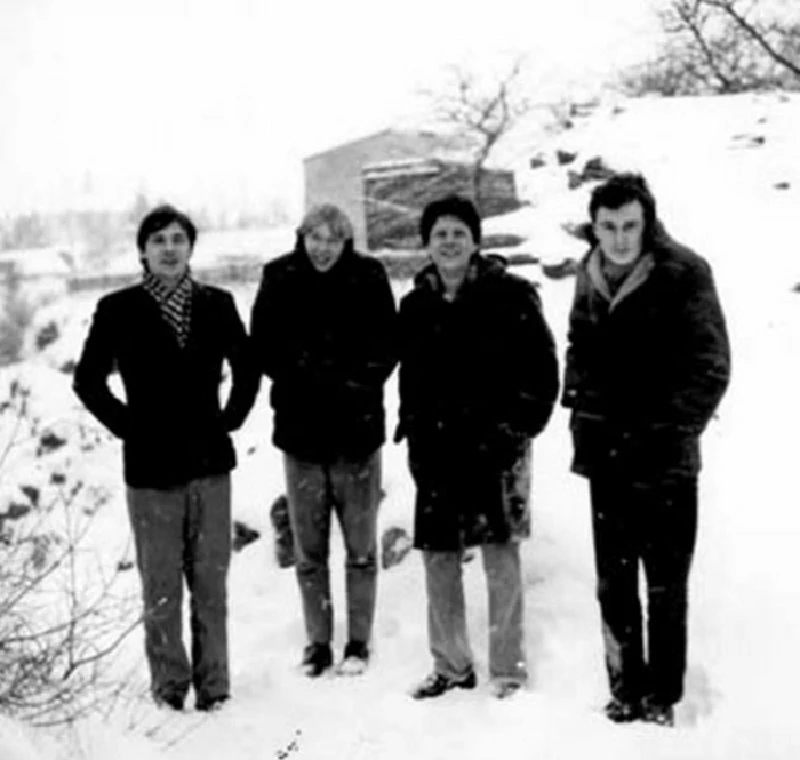
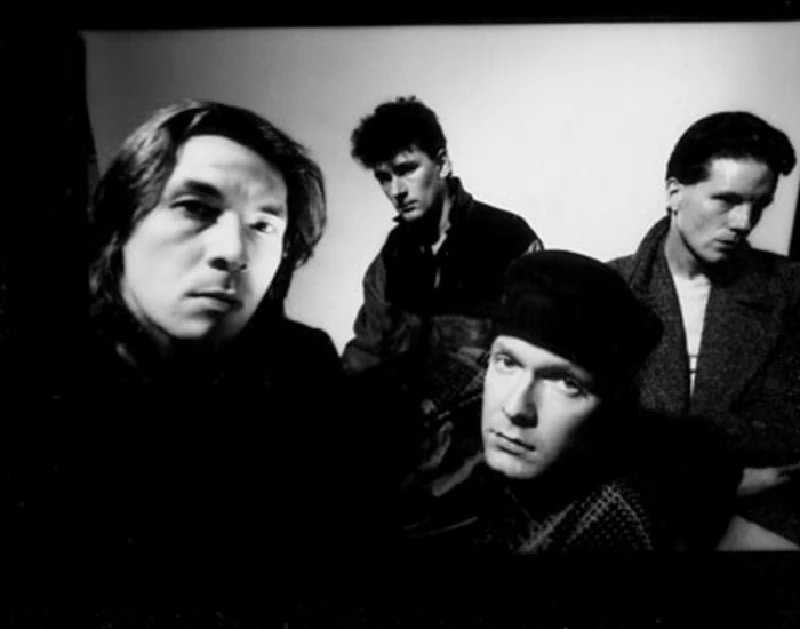
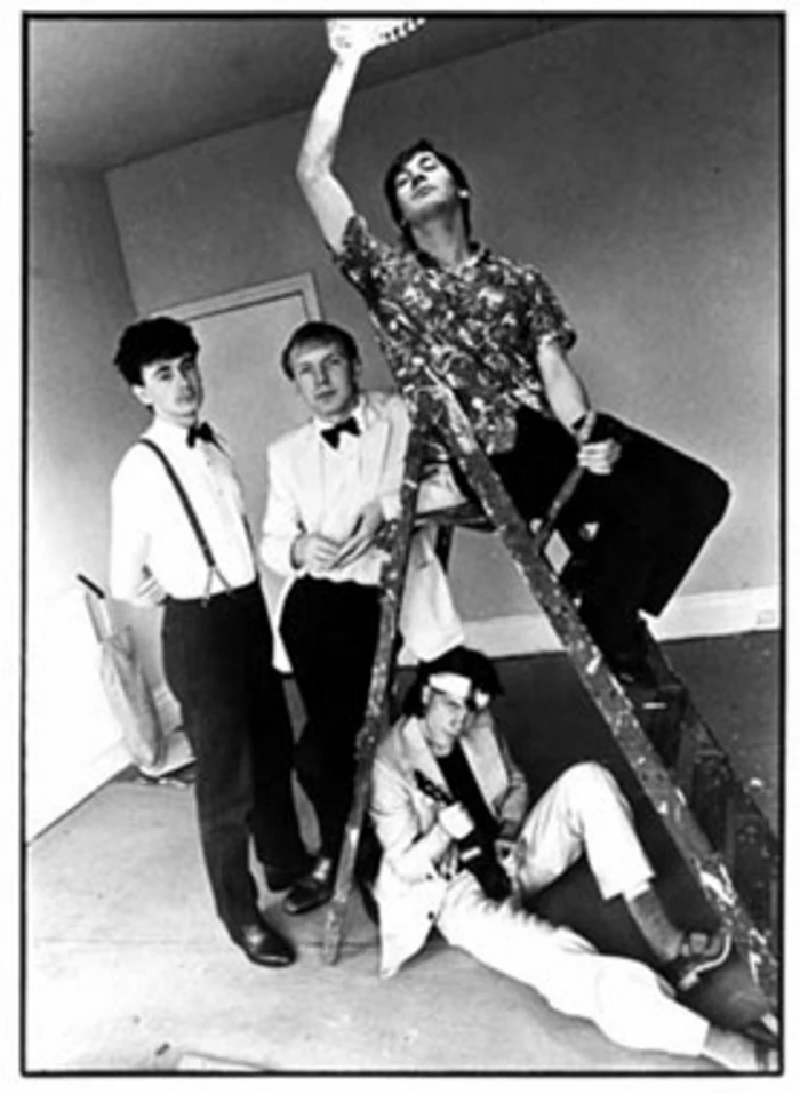
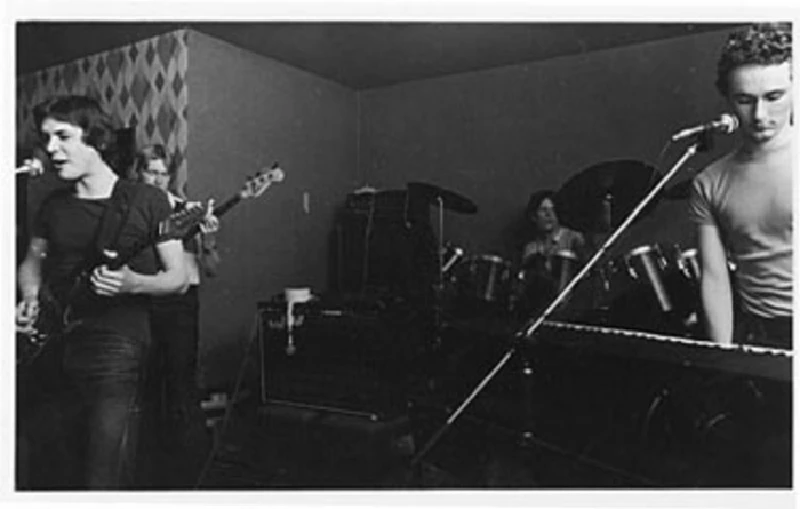
Visitor Comments:- |
| 16531 Posted By: James, Reading, UK on 18 May 2025 |
|
I'm very late to the Comsat Angels but I've done a lot of catching up. They really are an excellent band and I'm blown away by how good their songs are. Thanks for publishing this interview.
|
interviews |
|
Interview (2016) |
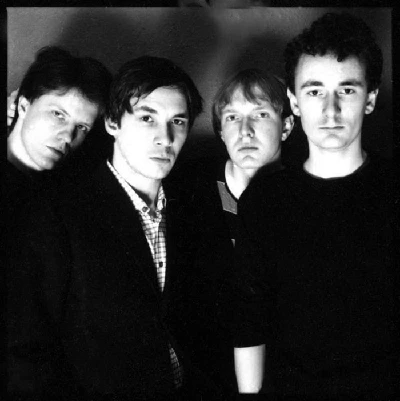
|
| Denzil Watson speaks to Stephen Fellows, the frontman from Sheffield-based 80's post-punk group the Comsat Angels, about the reissue of four of their albums in double CD editions |
profiles |
|
Profile (2007) |

|
| Brooding post-punk 80's and early 90's Sheffield act the Comsat Angels are in the process of having their back catalogue reissued by the Renascent label. Denzil Watson profiles the three latest re-releases, demos and rarities album, 'To Before' and latter releases, 'My Mind's Eye and 'The Glamour' |
live reviews |
|
Islington Academy, London, 24/10/2009 |
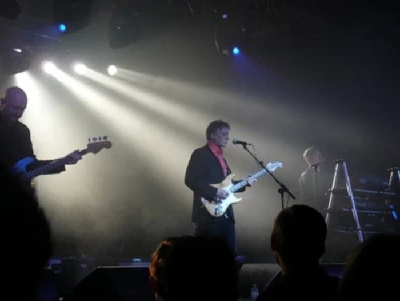
|
| On the last date of a short four day tour and their first London gig in nearly fifteen years, Anthony Strutt finds reformed Sheffield post-punks Comsat Angels to be both a powerful and still very contemporary live force |
most viewed articles
current edition
Carl Ewens - David Bowie 1964 to 1982 On Track: Every Album, Every SongArmory Show - Interview with Richard Jobson
Colin Blunstone - Thalia Hall, Chicago, 16/7/2025
Visor Fest - Valencia, Spain, 26/9/2025...27/9/2025
Bathers - Photoscapes 1
John McKay - Interview
Billie Eilish - O2 Arena, London, 10/7/2025
Sir Tim Rice - Interview
Loft - Interview
Robert Forster - Interview
previous editions
Heavenly - P.U.N.K. Girl EPManic Street Preachers - (Gig of a Lifetime) Millennium Stadium, Cardiff, December 1999
Beautiful South - Ten Songs That Made Me Love...
Oasis - Oasis, Earl's Court, London, 1995
Pixies - Ten Songs That Made Me Love...
Trudie Myerscough-Harris - Interview
Prolapse - Interview
Doris Brendel - Interview
Peter Perrett - In Dreams Begin Responsibilities Interview Part One
Simon Heavisides - Destiny Stopped Screaming: The Life and Times of Adrian Borland
most viewed reviews
current edition
Amy Macdonald - Is This What You've Been Waiting For?Sick Man of Europe - The Sick Man of Europe
Phew, Erika Kobayashi,, Dieter Moebius - Radium Girls
Lucy Spraggan - Other Sides of the Moon
Bush - I Beat Loneliness
Davey Woodward - Mumbo in the Jumbo
Alice Cooper - The Revenge of Alice Cooper
Suzanne Vega - Flying With Angels
Blueboy - 2
Cynthia Erivo - I Forgive You
Pennyblackmusic Regular Contributors
Adrian Janes
Amanda J. Window
Andrew Twambley
Anthony Dhanendran
Benjamin Howarth
Cila Warncke
Daniel Cressey
Darren Aston
Dastardly
Dave Goodwin
Denzil Watson
Dominic B. Simpson
Eoghan Lyng
Fiona Hutchings
Harry Sherriff
Helen Tipping
Jamie Rowland
John Clarkson
Julie Cruickshank
Kimberly Bright
Lisa Torem
Maarten Schiethart